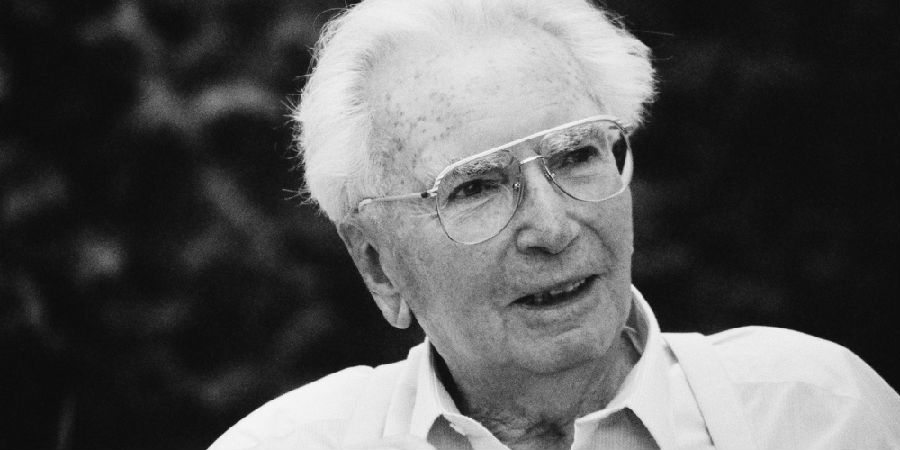(单词翻译:单击)
Post WWII
二战后
In April of 1945, Frankl had a welcome sight - American soldiers. They had come to liberate the concentration camps, meaning Frankl was once again a free man. He did not have family left, save for a sister who had escaped to Australia. He was essentially starting new in the world - but he had his ideas, his education, and his professional experience. So he put his ideas into writing.
1945年4月,弗兰克尔发现了一个不错的景象,那就是美国士兵。他们是来解放集中营的,这意味着弗兰克尔又一次自由了。除了一个逃到澳大利亚的姐姐,他一家人都没有离开。他基本上是开始了新的生活,但他有自己的想法,受过教育的他有十足的专业经验。所以他就把自己的想法写了下来。
In only nine days during the summer of 1945 Frankl dictated a full manuscript. The result was "Man's Search for Meaning," a description of what life was like in the concentration camps and the coinciding realizations Frankl had during his time as a prisoner about the need for meaning in human life and the role of suffering in the world. The book served as the basic outline for 'logotherapy,' the idea posited by Frankl that men are most driven by a search for meaning.
1945年夏天的短短九天时间里,弗兰克尔口授了一份完整的手稿。这就是《人类对意义的探索》一书,书中描述了集中营里的生活,以及弗兰克尔在囚禁期间对人类生活意义的需要和苦难在世界上的作用的一致认识。这本书是“意义疗法”的基本提纲,弗兰克尔认为人的驱动力通常是对意义的寻找。
By 1946, he was fully back into his professional world, running the Vienna Polyclinic of Neurology. By 1948, he had earned a PhD in Philosophy. He began teaching at the University of Vienna, where he would remain as a professor until 1990.
到了1946年,他全身心地投入自己的专业领域,经营着维也纳神经科综合医院。1948年,他获得了哲学博士学位。他开始在维也纳大学教书,在那里他将一直担任教授直到1990年。
After he was released from the concentration camp, Frankl also remarried. In 1947, he married Eleonore Schwint, and the two had a daughter together. As an adult, Frankl's daughter followed in her famous father's footsteps and became a child psychiatrist.
弗兰克尔从集中营获释后,也再婚了。1947年,他与埃莉诺·施温特结婚,两人育有一女。成年后,弗兰克尔的女儿追随她父亲的足迹,成为一名儿童精神病医生。
Though he was teaching at the University of Vienna, Frankl's teachings soon began to make a worldwide impact. With Freud and Adler as his predecessors, Vienna had already established itself as a center of psychological and psychiatric study. Freud and Adler were the first and second schools of Viennese Psychotherapy, and Frankl's ideas about man needing meaning in his life became the third.
尽管弗兰克尔在维也纳大学教书,但他的教导很快开始在世界范围内产生影响。有他前辈弗洛伊德和阿德勒的维也纳已经成为心理学和精神病学研究的中心。弗洛伊德和阿德勒是维也纳心理治疗的第一和第二派,弗兰克尔关于人在生活中需要意义的观点成为第三派。

By the mid 1950s Frankl was being invited to speak at universities around the world. He had also created the Austrian Medical Society for Psychotherapy, and headed up the organization. In 1955, the University of Vienna made him a full professor, and by 1961 he was serving as a visiting professor at Harvard and his ideas were being cemented in the minds of those studying psychotherapy in the United States. His academic career continued to grow, as he lectured at over 200 universities and was awarded an astonishing 29 honorary degrees. Though Man's Search For Meaning was by far his best known work, Frankl also wrote and published 39 other books during his lifetime. In 1970, he was honored by his peers when they created the "Viktor Frankl Insitute."
到了20世纪50年代中期,弗兰克尔被邀请到世界各地的大学演讲。他还创建了奥地利心理治疗医学会,并领导该组织。1955年,维也纳大学任命他为正式教授,到1961年,他成为哈佛大学的客座教授,他的思想在美国研究心理治疗的学者心中根深蒂固。他的学术生涯继续发展,他在200多所大学讲学,并获得高达29个荣誉学位。尽管到目前为止,《人类对意义的探索》一书是弗兰克尔最著名的作品,但他一生还创作和出版了另外的39本书籍。1970年,他的同龄人创建了“维克多·弗兰克尔研究所”以表示尊敬。
Among his academic work, Frankl still worked with patients. One of his methods was to ask the most depressed patients he encountered a seemingly simple six word question ... Why do you not commit suicide? From here, Frankl would discover what it was that the patient actually found joy in, what made their life worth living ... in other words, what the meaning was in their life. Once that discovery was made, he could start helping them to improve their mental health and to move away from thoughts of suicide.
在他的学术道路上,弗兰克尔依然坚持治病救人。他有一个方法:问最抑郁的病人一个看似简单的六字问题——你为何不自杀?从答案中,弗兰克尔会发现令病人感到真正快乐的是什么,让病人还值得活下去的东西是什么……换句话说,他们生活的意义是什么。一旦这个发现被发现,他就可以开始帮助他们改善心理健康,摆脱自杀的念头。
As the 20th century progressed, Frankl shared his ideas in media beyond print. He appeared on television to discuss his ideas, bringing them to an entirely new audience. In one of his most famous television appearances he expounded on his idea that in the search for life's meaning one must have a balance of freedom and responsibility. During the discussion, he advocated for the United States to have a partner monument for the Statue of Liberty. The country should be bookended with a statue of responsibility on the West Coast, he argued. "Freedom, however, is not the last word. Freedom is only part of the story and half of the truth. Freedom is but the negative aspect of the whole phenomenon whose positive aspect is responsibleness. In fact, freedom is in danger of degenerating into mere arbitrariness unless it is lived in terms of responsibleness. That is why I recommend that the Statue of Liberty on the East Coast be supplemented by a Statue of Responsibility on the West Coast"
还是在20世纪,弗兰克尔在纸媒以外的平台上分享了他的想法。他出现在电视上,与大家讨论自己的想法,把它们带到全新的受众面前。在他最著名的一次电视节目中,他阐述了自己的观点,即在寻找生命的意义时,必须在自由和责任之间取得平衡。在讨论中,他主张美国为自由女神像设立一个伙伴纪念碑。他认为,美国应该在西海岸设立一座责任雕像。“然而,自由不是最后的定论。自由只是故事的一部分,也是真理的一半。自由只是整个现象的消极方面,其积极方面是责任。事实上,除非自由是以责任的方式存在,否则它有可能退化为纯粹的任意性。所以我建议东海岸的自由女神像辅之以西海岸的责任女神像。”
Answering letters and doing interviews, Frankl continued to share his message and teach the world about his theories of psychoanalysis right up until his death in 1992. In one of his last interviews, Frankl made the poignant observation that even looking back decades later, he could still find value in his suffering at the concentration camps. As he saw it, the suffering gave him a valuable perspective on what real trouble is, making him more appreciative of the life he could live freely from 1946 onward. "What I would have given then if I could have had no greater problem than I face today," he said in 1995.
除了回信和接受采访,弗兰克尔继续分享他的信息,并向全世界传授他的精神分析理论,直到他1992年去世。在弗兰克尔的最后一次采访中,他提出了一个深刻的发现:即使在几十年后回首往事,他仍然可以从他在集中营所遭受的痛苦中找到价值。在他看来,这场苦难使他对真正的麻烦有了一个有价值的看法,使他更加珍惜从1946年起重获自由的生活。1995年时,他曾说:“如果我没有面临如今的大问题,我会付出什么代价。”


